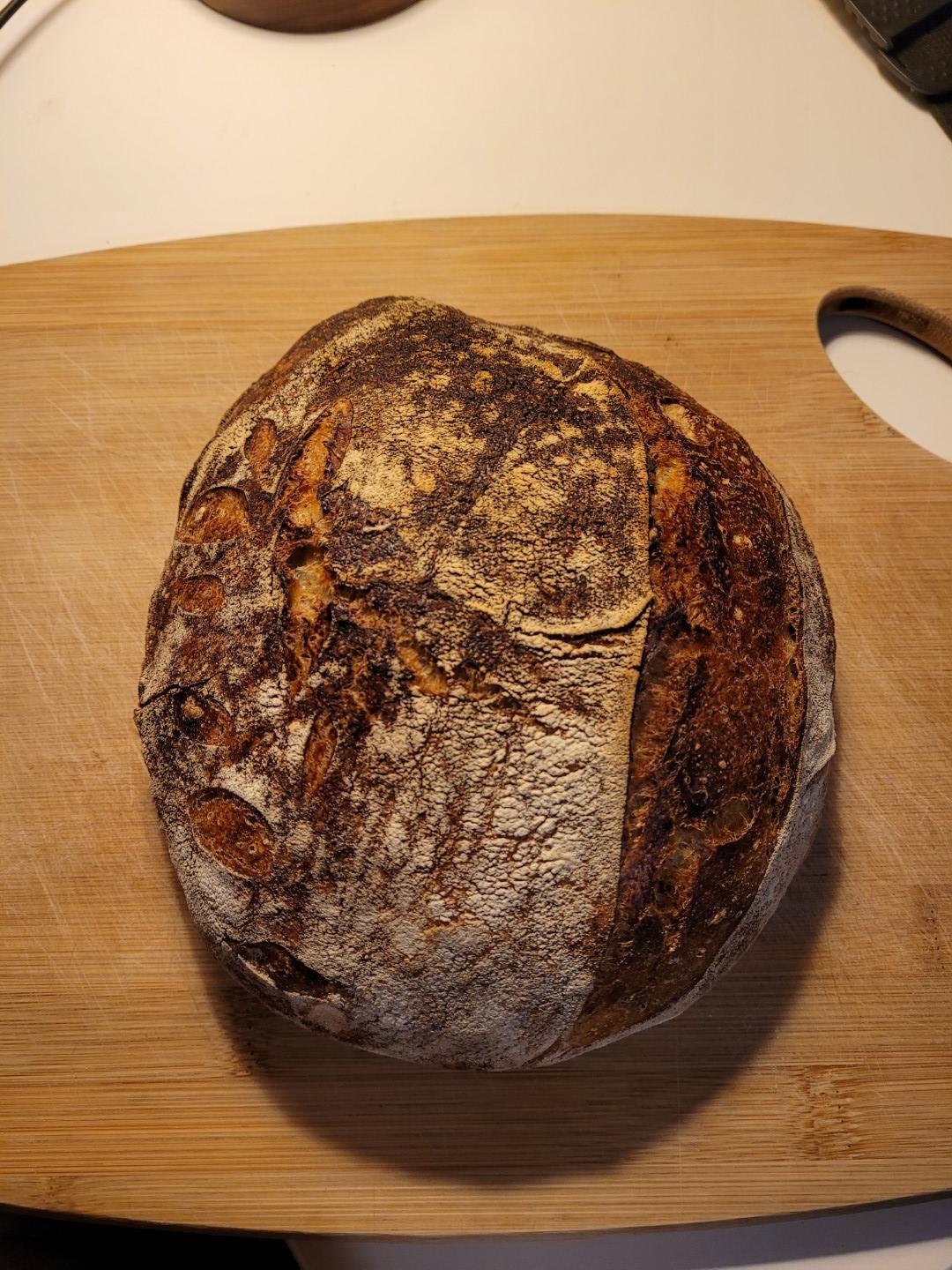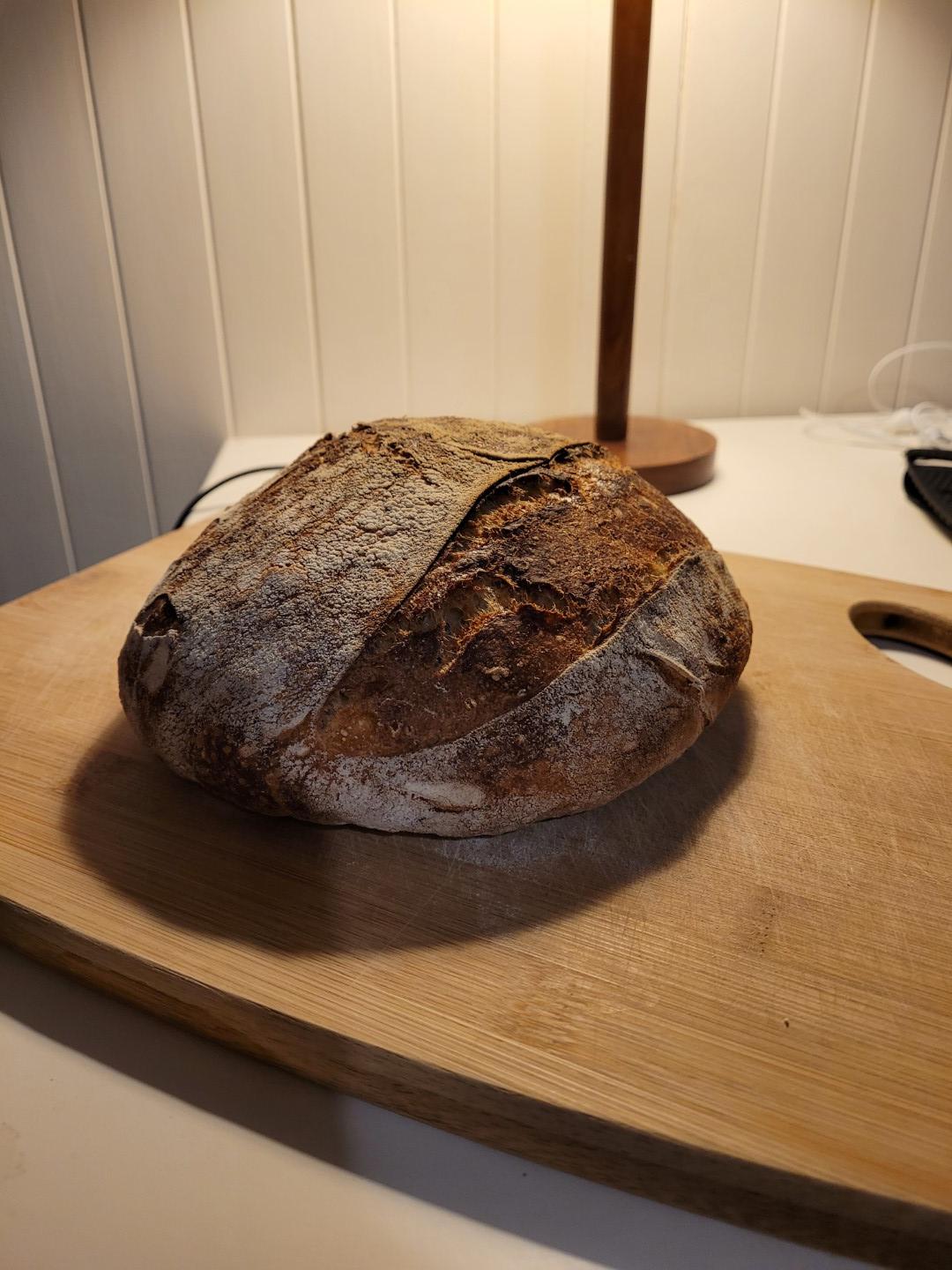Forkish's Overnight country blonde - FWSY



108g starter
13g T150 (whole wheat)
402g T65 (wheat)
25g T110 (rye)
301g water
11g salt
12% less water than in original recipe
6h bulk fermentation at 76.5°F (24.7°C) / Preshaping / 20 mn rest / Shaping / 3h20 proof in the fridge.
5 stretches and folds during the first 2 hours of bulk fermentation.
30 mn in dutch oven lid on / 12 mn lid off.
Does the bread seem overproofed or underproofed ? Should I change bulk or proof times ? Maybe the scoring or shaping could be improved ?
It seems I could get a better rise / oven spring and maybe a less dense crumb ?
Thanks !
First, your bread looks fine and probably tastes fine too (which is the more important of the two).
What was the state of the dough at the end of the six-hour bulk fermentation? The combination of 108 grams of starter (seems like a lot more than needed for this amount of dough) and a temperature of 76.5F makes me think that six hours was perhaps too long. Hence my focus on the condition of the dough just before you did the pre-shape.
Was the dough billowy? Were bubbles visible? If you shook the container of dough back and forth did the dough jiggle? Just after the final stretch-and-fold did the dough have greater strength than at the start? During the period between that last S&F and the end of the bulk fermentation did the dough spread a lot toward the sides of the container or instead tend to hold its shape? These are all factors in determining whether the bulk fermentation needs to go on or instead should be ended.
Happy baking.
Ted
dough expanded and was jiggly. After the final stretch-and-fold, dough hold its shape better than at the start. And yes, at the end of bulk fermentation, the dough spread toward the sides of the container.
Dough seemed to already pass the finger dent test just after shaping, but I'm never really sure about that test.
Nearly everyone comments that Forkish time frames are too long, and I found in the beginning of doing his recipes that I tended to go too long with both the bulk fermentation and the proofing. For example, a bulk fermentation that goes too long will result in a breakdown of the gluten and a slurry mass that cannot be shaped at all.
You already reduced the hydration of the dough, and I would have expected that to create a slightly more compact dough that would have retained its shape more each time after a stretch-and-fold. If the dough was spreading somewhat quickly toward the sides of the container after the final S&F, it is possible that you were past the optimal point of ending the bulk fermentation.
Your loaf looks essentially fine, however, so you were not severely past the optimal (in in fact that is what occurred -- I am still not sure). My suggestion would be to bake this bread again and end the bulk fermentation at an earlier point. I looked at my notes for the Overnight Country Brown (the sister bread to the Blonde), and when the kitchen temperature in the winter is in the 68-71F range my overall bulk fermentation is around six hours, but in the summer when the temperature is 75-78F the bulk reduces to about four hours.
Lastly, I should comment that I looked at the recipe and realized that your 108 grams was the levain (and not starter alone). You had a uniform bake in that the crust is nicely colored all around the perimeter, the crumb might be a bit denser than you wanted but still has some airy portions, and you had oven spring.
Please see Skibum's schedule for bulk and proof here
https://www.thefreshloaf.com/node/42879/overnight-country-blonde-take-3
He did 15.5hrs (!!!) bulk at 21C+1C which he says was a bit too much, the dough peaked and started falling, and a 3.5 hours proof. His crumb resembles what I see in Ken Forkish book and on his bakery website.
Granted, Skibum bakes with Canadian flours which are two times stronger than what you are using and have 2 times more gluten, but that is what he did.
The most important feature is to let the dough rise to the max and stay there, testing the limits of its fermentation tolerance but not let it fall. Then shape and proof until it at least doubles in volume.
Here is his take 6, also beautiful, fermented in summertime, so his schedule changed due to higher temp.
https://www.thefreshloaf.com/node/42992/overnight-country-blonde-well-sort